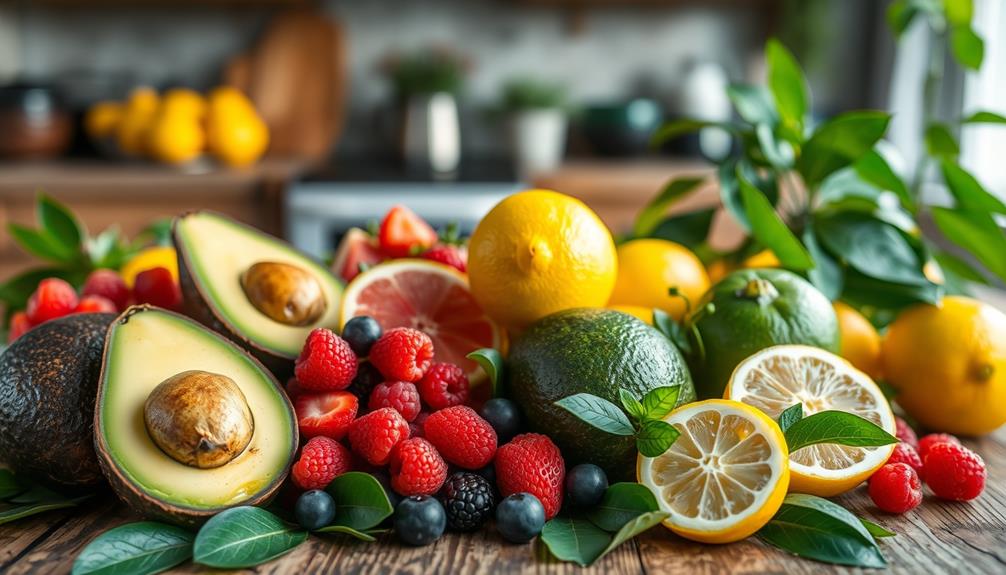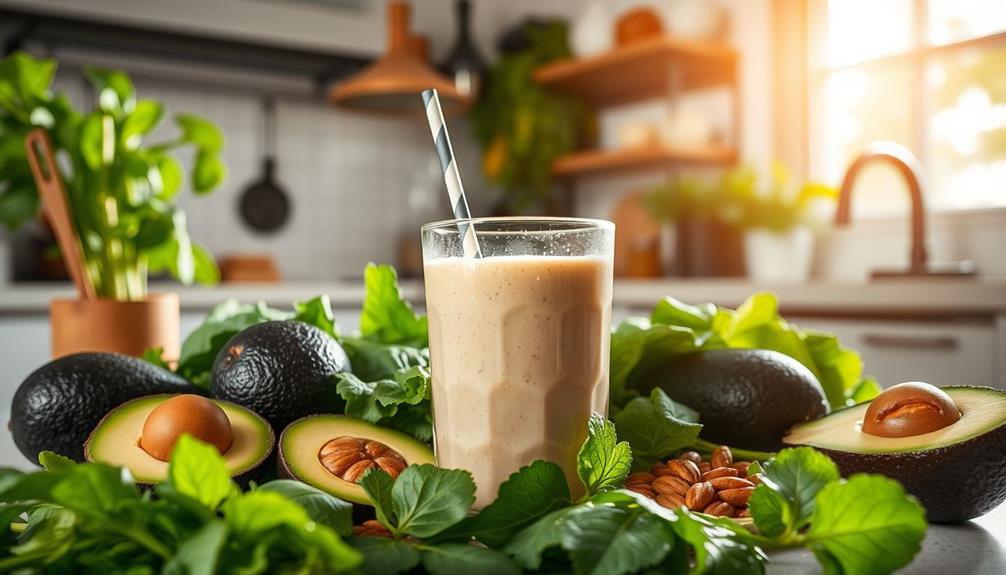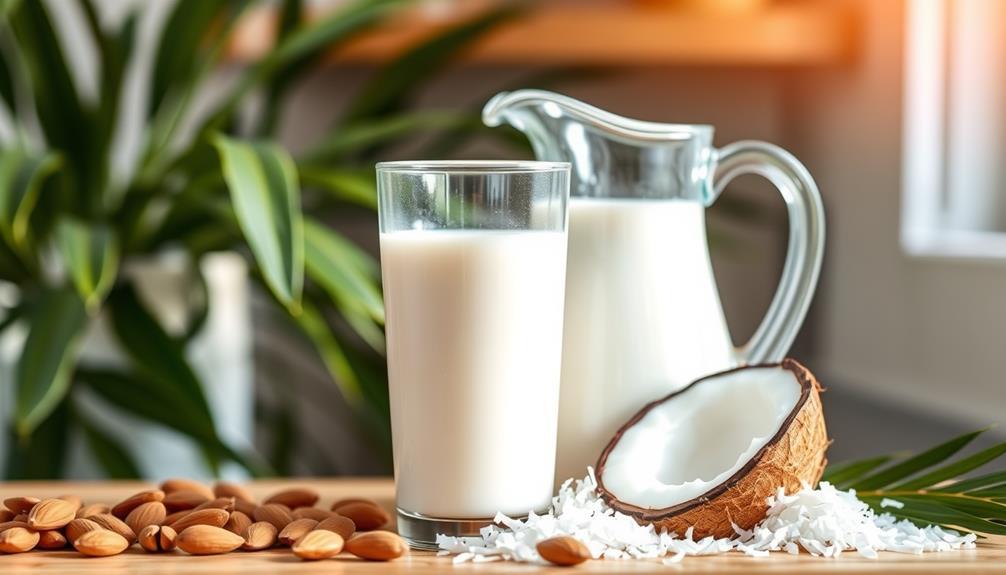Yes, you can eat fruit on the keto diet, but you need to choose wisely. Focus on low-carb options like avocados, berries, lemons, and watermelon. These fruits fit well within your daily carb limits, typically set at 20-50 grams of net carbs. However, avoid high-carb fruits like bananas, grapes, and mangoes, as they can quickly exceed your limits. Portion control is essential, so track your intake to stay in ketosis. If you want more tips on incorporating fruits into your keto lifestyle, you'll find valuable insights just ahead.
Key Takeaways
- Yes, you can eat fruit on the keto diet, but focus on low-carb options like avocados, berries, and tomatoes.
- Limit total carb intake to 20-50 grams of net carbs daily, including fruit consumption.
- Nutrient-dense fruits like lemons and watermelons can be enjoyed in moderation without exceeding carb limits.
- Practice portion control to enjoy fruity flavors while maintaining ketosis; track carb contributions from fruits carefully.
- Consulting a health professional can help tailor fruit choices to align with individual health goals on the keto diet.
Overview of the Keto Diet
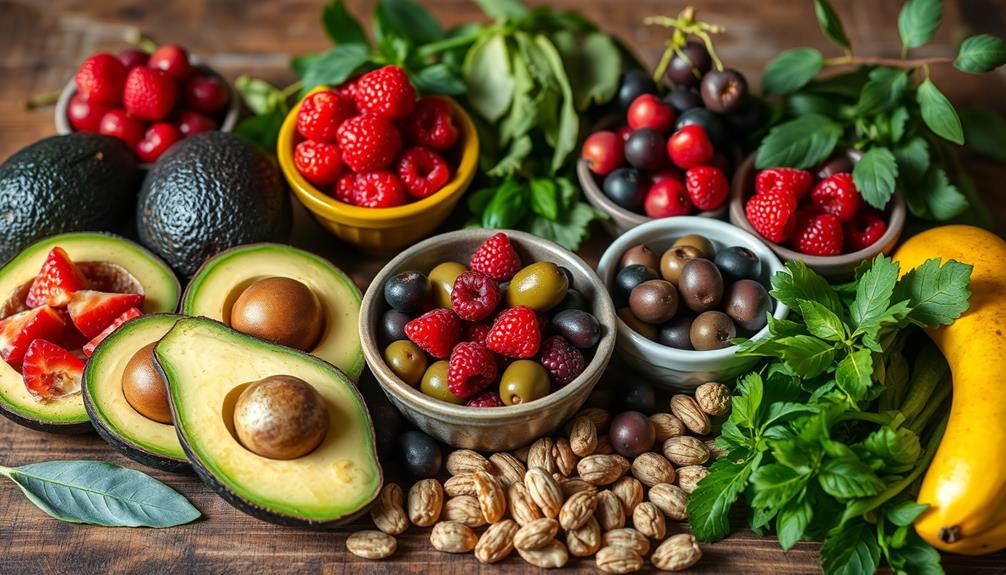
The Keto Diet is a high-fat, low-carb eating plan that can help you achieve ketosis, a metabolic state where your body burns fat for fuel instead of carbohydrates. By limiting your carbohydrate intake to less than 20-50 grams per day, you encourage your body to enter ketosis, converting fat into ketones for energy. This shift can lead to effective weight loss and improved metabolic health.
In a standard Keto macronutrient ratio, you'll consume approximately 70-75% fat, 20-25% protein, and just 5-10% carbohydrates. This means you'll focus on incorporating healthy fats into your meals while being mindful of net carbs from food sources.
Careful meal planning is essential, as tracking your macronutrient ratios guarantees you maintain ketosis without sacrificing nutrient intake.
Originally developed in the 19th century for weight loss and diabetes management, the Keto Diet is now the subject of research for its potential benefits in various medical conditions.
Whether you're aiming for weight loss or overall health improvement, understanding the principles of Keto is important for your success on this low-carb journey.
Benefits of Keto-Friendly Fruits
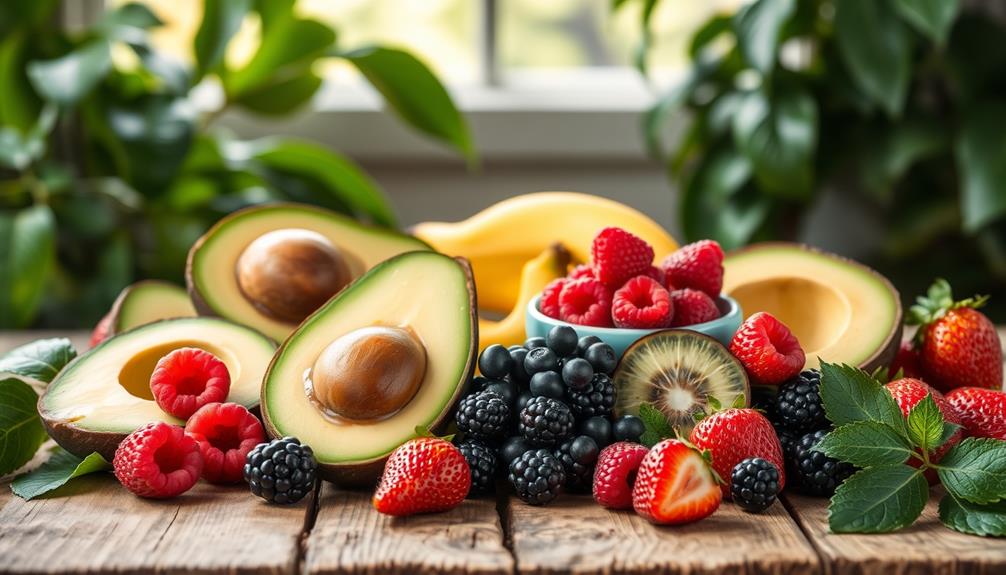
Incorporating keto-friendly fruits into your diet can enhance your meals while keeping your carb count in check.
These fruits not only satisfy your sweet cravings but also provide essential nutrients that support a healthy keto lifestyle. Additionally, it's important to take into account the overall balance of your diet, as cold medications can interact with certain foods.
Here are some benefits of including them in your meals:
- Avocados: Low in net carbs (about 1.5 grams per 100-gram serving) and high in healthy monounsaturated fats, they're perfect for staying on track.
- Berries: Packed with antioxidants and high in fiber, just 7 to 11 grams of net carbs per cup makes them a delicious option for maintaining ketosis.
- Citrus fruits: Lemons and limes deliver a hefty dose of vitamin C, with only 4 to 5 grams of net carbs each, boosting your immune function.
Low-Carb Fruits to Include

When you're on the keto diet, selecting low-carb fruits can be a game-changer for your meals. Incorporating these fruits not only satisfies your sweet tooth but also keeps your net carbs in check.
Avocados are a fantastic option, packing about 1.5g of net carbs per 100 grams. They're a healthy source of fats, making them a staple in your diet. Additionally, these fruits can provide essential vitamins and antioxidants, contributing to overall health, much like how cranberry juice is rich in antioxidants.
Berries, especially strawberries and raspberries, are also great choices. A cup of strawberries has around 8.7g of net carbs, while raspberries offer similar benefits. You can enjoy them in moderation to add flavor and nutrients to your meals.
Watermelon is another hydrating low-carb fruit, with about 11g of net carbs per cup. Just remember to enjoy it in moderation.
Lemons, with approximately 4.5g of net carbs each, can enhance your dishes and drinks while keeping things fresh and flavorful.
Finally, don't forget about tomatoes, which contain about 5g of net carbs per cup.
These low-carb fruits not only fit your keto lifestyle but also contribute to a healthy, balanced diet.
Fruits High in Carbs to Avoid

Avoiding high-carb fruits is essential for staying in ketosis. When you're on the keto diet, it's important to limit your carbohydrate intake, and certain fruits can derail your progress.
Understanding your budget for carb consumption is just as important as managing your finances. Here are some high-carb fruits to avoid:
- Bananas: Approximately 27g of carbs per medium fruit.
- Grapes: About 17g of carbs per cup.
- Cherries: 24.6g of carbohydrates per cup.
Additionally, fruits like mangoes and pineapples are also high in carbs, with mangoes containing around 22.5g of carbs per cup and pineapples providing about 21g per cup of chunks.
Dried fruits, such as raisins and apricots, are particularly problematic due to their concentrated sugars, making them a significant source of carbohydrates.
Steering clear of these high-carb fruits will help you maintain your keto lifestyle and keep your carb count in check.
Portion Control for Fruit Intake
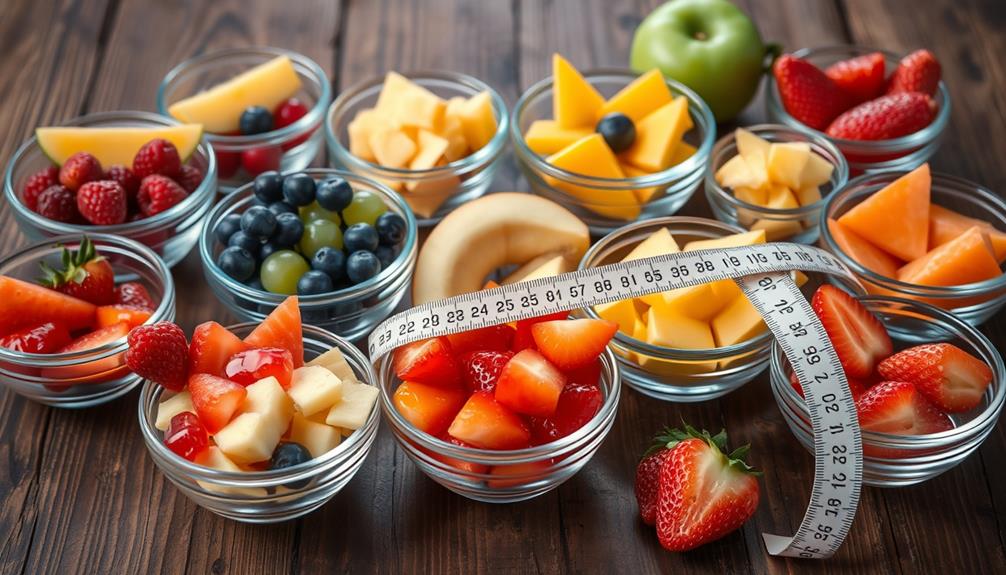
Managing portion sizes is key to enjoying fruit on the keto diet without jeopardizing your carb intake. With your daily carbohydrate limit usually set between 20-50 grams of net carbs, it's important to practice portion control to stay within this range. For instance, one cup of strawberries packs about 11.7 grams of net carbs, so limiting your serving size to around one cup is vital.
Incorporating low-carb fruits like raspberries can also provide health benefits, such as antioxidants that support overall wellness while adhering to your dietary goals. Additionally, essential oils for respiratory health can enhance your well-being as you navigate your keto lifestyle.
Keto-friendly options like avocados can be a great addition to your diet, as a half avocado contains only 1.5 grams of net carbs, allowing for larger portions. When you consider other low-carb fruits, raspberries are a fantastic choice, offering just 7 grams of net carbs per cup. This flexibility lets you enjoy fruit while still managing your carbohydrate intake effectively.
Tracking your overall carb consumption, including fruit options, is important for maintaining ketosis. By being mindful of your serving sizes and choosing low-carb fruits, you can savor the delicious benefits of fruit on the keto diet without exceeding your daily limits.
Nutritional Profiles of Keto Fruits
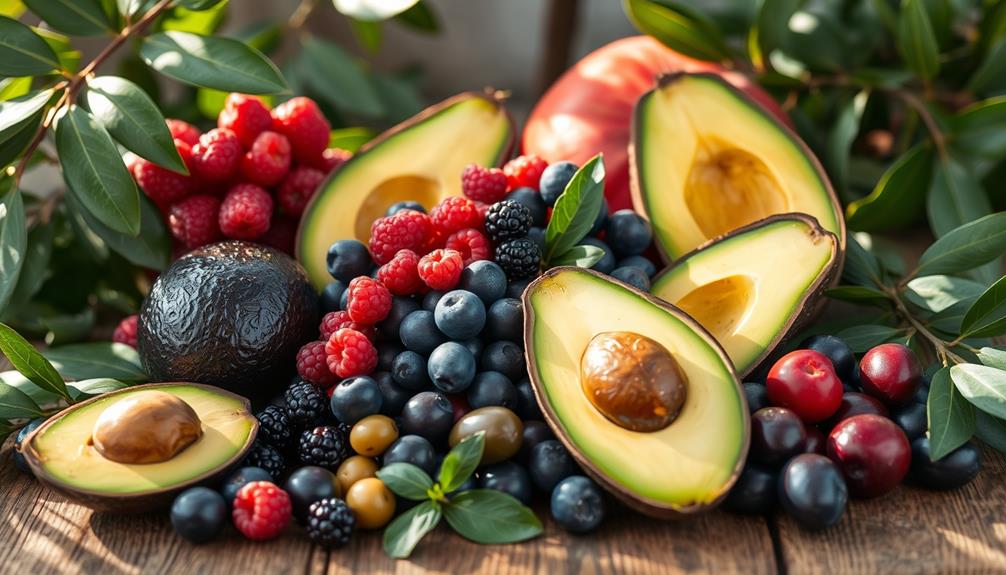
Understanding the nutritional profiles of keto-friendly fruits can empower you to make informed choices while adhering to your diet. While many fruits are high in carbohydrates, some options fit well within a low carb lifestyle. Incorporating fruits that are low in sugar can also be beneficial for managing insulin resistance, providing essential vitamins and minerals without compromising your dietary goals.
Here are a few fruits to take into account:
- Avocados: With only about 1.5 grams of net carbs per 100-gram serving, they're a top choice for keto dieters. Plus, their healthy fats provide numerous health benefits.
- Berries: Strawberries and raspberries are excellent options. A cup of strawberries contains around 8.7 grams of net carbs, making them a delicious, low carb treat.
- Lemons: One lemon has roughly 4 grams of net carbs, perfect for adding flavor without derailing your keto goals.
Other fruits, like tomatoes and watermelon, also have manageable carbohydrate content. A cup of tomatoes yields about 5 grams of net carbs, while watermelon comes in at around 11 grams per cup.
Health Benefits of Specific Fruits
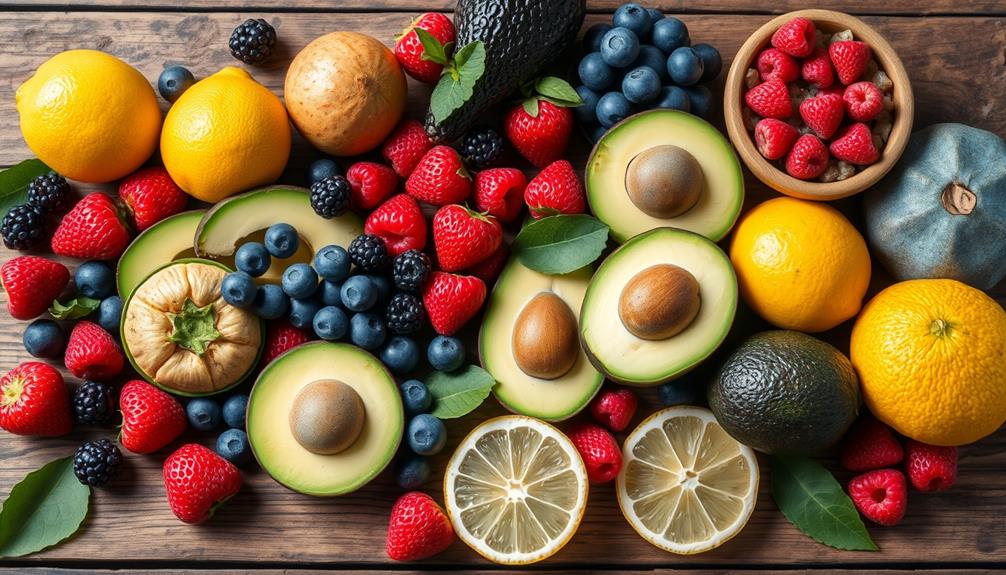
When you're on a keto diet, choosing the right fruits can boost your health. Fruits like avocados and raspberries are nutrient-dense and packed with antioxidants, helping reduce inflammation and support heart health.
Additionally, the benefits of rooibos tea can complement your diet, as it's caffeine-free and rich in antioxidants, further promoting overall wellness.
Let's explore how these fruits contribute to your overall wellness while fitting into your low-carb lifestyle.
Nutrient Density of Fruits
Fruits can be a delicious addition to your keto diet, offering a wealth of nutrients while keeping carb counts low. Many fruits are nutrient-dense, meaning they provide essential vitamins and minerals compared to their carb count.
For instance, understanding the mechanics of various brewing methods can enhance your overall health lifestyle, including diet choices. Here are a few you might consider:
- Avocados: With about 1.5 grams of net carbs per 100 grams and nearly 7 grams of fiber per serving, they're rich in heart-healthy fats.
- Raspberries: Containing only 7 grams of net carbs per cup and 8 grams of fiber, they're an excellent source of vitamin C and manganese.
- Lemons: Offering around 5.5 grams of carbs and 1.5 grams of dietary fiber, they're high in vitamin C, supporting your immune function.
When you choose fruits, it's important to look at the total carbohydrates and calculate net carbs per cup by subtracting fiber.
While some fruits, like strawberries and tomatoes, have higher carb counts, they still provide significant health benefits. By focusing on low in net carbs and high in fiber options, you can enjoy nutrient-dense fruits while adhering to your keto lifestyle.
Antioxidant Properties Explained
Antioxidants play an essential role in maintaining your health, especially when following a keto diet. Incorporating fruits like raspberries, strawberries, avocados, and lemons can provide you with a wealth of these beneficial compounds.
Raspberries are packed with antioxidants such as quercetin and ellagic acid, which contribute to heart health and may lower the risk of chronic diseases. Additionally, understanding the importance of early detection in health management can motivate you to prioritize your overall well-being and screenings like mammography guidelines.
Strawberries are another great option; they're rich in anthocyanins that support cardiovascular health and may help reduce cholesterol levels. Including these berries in your diet can combat oxidative stress and reduce inflammation, enhancing overall well-being.
Don't overlook avocados, either! These low-carb fruits are loaded with antioxidants like lutein and zeaxanthin, promoting eye health and protecting against age-related degeneration.
Impact on Heart Health
Incorporating specific fruits into your keto diet can greatly impact heart health. By choosing the right fruits, you can support your cardiovascular system and reduce the risk of heart disease. Additionally, diversifying your diet with nutrient-rich options, including fruits, can be beneficial for overall wellness and longevity, as seen in investment strategies in precious metals.
Here are some fruits to evaluate:
- Avocados: Packed with heart-healthy monounsaturated fats, potassium, and fiber, avocados can help lower LDL cholesterol levels and improve overall cardiovascular health.
- Berries: Strawberries and raspberries are rich in antioxidants like anthocyanins, which reduce inflammation and lower the risk of heart disease.
- Watermelon: This juicy fruit contains lycopene, an antioxidant known for reducing blood pressure and oxidative stress, benefiting heart health.
Additionally, fruits like lemons and tomatoes, high in vitamin C and lycopene, contribute to improved cholesterol levels and reduced inflammation.
By including these fruits in your diet, you can enhance your intake of antioxidants and promote better cardiovascular health. Just remember to keep your portions in check to stay within your carb limits.
Prioritizing these fruits can be a smart strategy to maintain a healthy heart while enjoying your keto lifestyle.
Tips for Incorporating Fruits
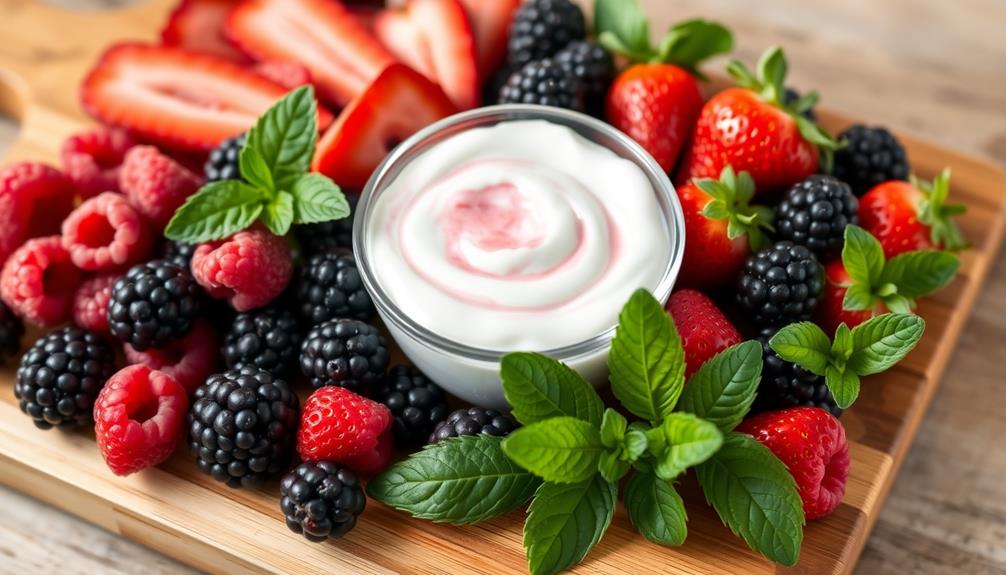
When you're adding fruits to your keto diet, focus on low-carb options like berries and avocados to keep your carb count in check.
It's also beneficial to take into account the essential oils for skin conditions that can help with any skin issues resulting from dietary changes.
Practice portion control by limiting your servings to maintain ketosis while still enjoying their flavors.
Choose Low-Carb Options
Choosing low-carb fruits is vital for maintaining your keto diet while still enjoying a variety of flavors. By selecting fruits that are low in net carbs per serving, you can indulge without jeopardizing your carb intake.
Here are some excellent options to take into account:
- Avocados: With only about 1.5 grams of net carbs per 100-gram serving, they're perfect for your keto meals.
- Berries: Strawberries and raspberries offer 8.7 grams and 7 grams of net carbs per cup, respectively, providing antioxidant benefits while keeping your carb counts low.
- Citrus Fruits: Small lemons and limes pack around 4 grams of net carbs, adding a fresh burst of flavor to your dishes.
It's important to monitor portion sizes closely, especially with berries. Limiting your intake to one serving a day can help you stay within your daily net carb goals of 20-50 grams.
Track your overall carbohydrate intake diligently, as even low-carb fruits can add up. This way, you'll guarantee you remain in ketosis while enjoying the delicious flavors of these fruits on your keto diet.
Practice Portion Control
Practicing portion control is key to enjoying fruits on your keto diet without exceeding your carb limits. Even low-carb fruits can add up quickly, so it's crucial to be mindful of your serving sizes.
For instance, one cup of strawberries contains approximately 11.7 grams of carbs, and you'll want to keep your total carbohydrate intake within 20-50 grams per day for ketosis.
To effectively incorporate fruits, consider measuring out servings. Enjoying one cup of berries daily, like raspberries, which have only 7 grams of net carbs per cup, can satisfy your sweet tooth without sabotaging your carb allotment.
If you crave variety, limit yourself to fruits like peaches and cantaloupes, which have higher carb counts—15 grams and 12.7 grams per cup, respectively.
When you're measuring out servings, think about portion control with fruits like avocados, too; just one-half of an avocado has about 1 gram of net carbs.
Monitor Total Carbs
Monitoring total carbs is essential for successfully incorporating fruits into your keto diet. To maintain ketosis, you should aim for a daily net carb limit of 20-50 grams, which includes the carbohydrates from the fruits you consume.
It's vital to track your fruit intake, as even low-carb fruits can add up quickly.
Here are some tips to help you manage your carb intake:
- Prioritize low-sugar fruits: Avocados and berries are fantastic choices, with avocados having just 1.5g net carbs per half and berries averaging up to 7g net carbs per cup.
- Calculate net carbs: Remember to subtract fiber from total carbs to get an accurate net carb count for each fruit.
- Watch portion size: Limit servings of higher-carb fruits like peaches and cantaloupe, which can contain over 11g net carbs per cup.
Consulting a Health Professional

Consulting a healthcare professional before starting the keto diet is essential for tailoring your approach to fit your individual health goals and dietary needs. A registered dietitian can offer personalized guidance on how to effectively incorporate fruits while adhering to your carbohydrate limits.
They'll help you choose options that align with your keto plan without compromising your nutritional intake.
Working with healthcare professionals also allows you to monitor critical health markers, ensuring that your body responds well to the diet. This oversight can help you avoid potential nutrient deficiencies that might arise from restrictive eating.
Professional advice is indispensable for understanding the long-term sustainability of the keto diet, as it can affect your overall health in various ways.
Regular check-ins with your healthcare provider can help you adapt your diet based on individual responses and changing health conditions. They can make necessary adjustments to keep you on track toward your goals while safeguarding your well-being.
Frequently Asked Questions
What Fruit Can You Eat on Keto?
You can enjoy berries, avocados, and tomatoes on keto due to their low net carb content. Lemons add flavor with minimal carbs, while watermelon's best in moderation. Focus on these fruits for a balanced keto approach.
What Fruits Are Not Keto-Friendly?
You should avoid high-carb fruits like bananas, grapes, mangoes, cherries, and pineapples on your keto journey. Dried fruits, including raisins and apricots, are also not keto-friendly due to their concentrated sugar content.
Can I Eat Fruit on Keto and Still Lose Weight?
Yes, you can eat fruit on keto and still lose weight. Focus on low-carb options like berries and avocados, but keep track of your carb intake to maintain ketosis and support your weight loss goals.
Can I Eat an Apple on Keto?
An apple symbolizes temptation, but if you're on a strict keto path, it might not be your best choice. Its carbs can pull you away from ketosis, so consider lower-carb fruits instead for better results.
Conclusion
In the world of keto, fruits can be both a treat and a temptation. While you might think all fruits are off-limits, some low-carb options can fit seamlessly into your diet. Embrace berries for their sweetness without the carb overload, but steer clear of bananas that can derail your progress. With mindful choices and portion control, you can enjoy the best of both worlds—satisfying your cravings while staying on track with your health goals.
